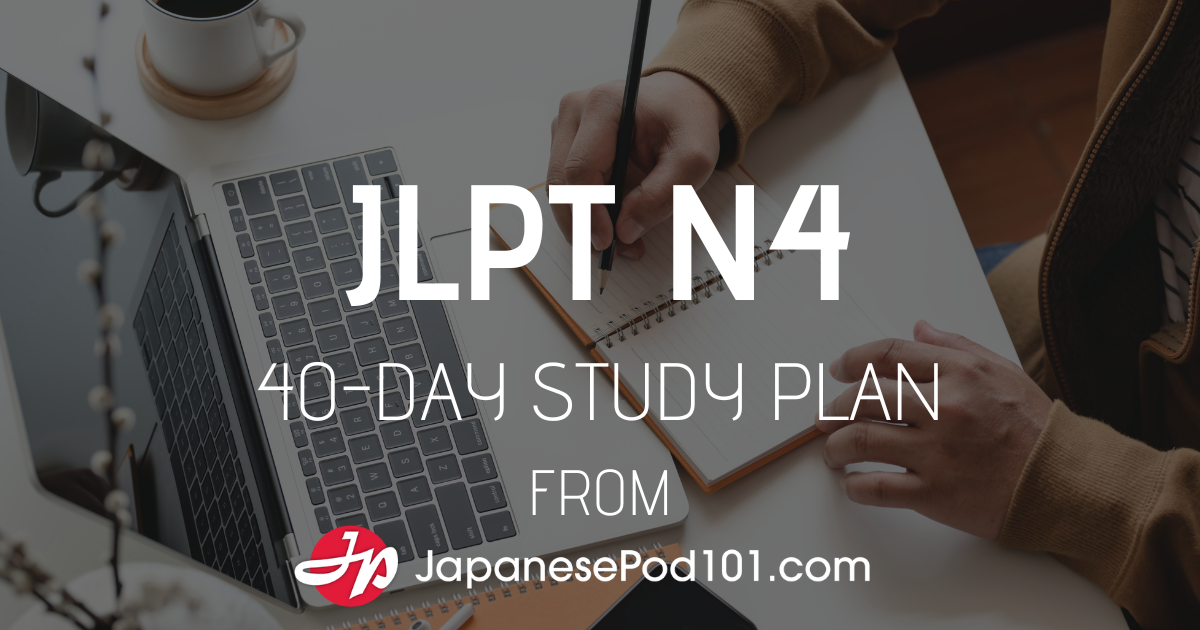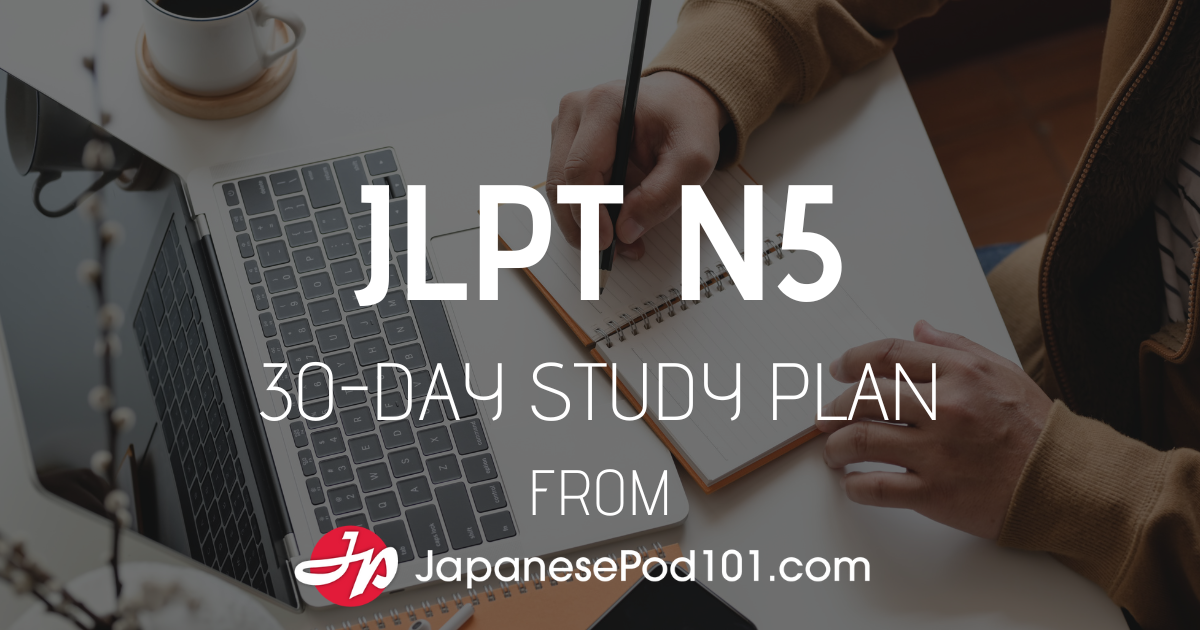
1. Can 40 Days Really Prepare You for JLPT N4?

Many learners hear they need hundreds of hours to pass the JLPT N4. That can feel overwhelming, especially if you’re juggling school, work, or other commitments.
But here’s a game-changing insight: you don’t need to cram every single hour to pass. Instead, focus on quality, not just quantity. This 40‑day plan allocates around 80 hours total, about 2 hours daily. That may sound difficult, but it’s structured to target the exact grammar, vocab, kanji, and listening you need, no fluff.
2. How the JLPT N4 40-Day Plan Works

A. What It Is
The 40-day JLPT N4 study plan is more than just a list of lessons, it’s a full curriculum built to help you succeed. It guides you step-by-step through JapanesePod101’s official N4 grammar, vocabulary, kanji, and listening resources.
Each day includes a carefully selected mix of lessons from seven essential learning paths, including practice drills, quizzes, and assignments
With Japanesepod101’s bite-sized, mobile-friendly lessons, you get:
- Audio & video lessons
- Grammar breakdowns
- Kanji and vocabulary quizzes
- Listening & Pronunciation practice
- JLPT N4 practice tests
B. Why 40 Days?
Long, drawn-out study schedules may feel “safe,” but they’re often inefficient. Research in cognitive science shows that spaced repetition and focused, time-constrained learning improve retention and recall.
Studies in journals like Psychological Science show that learners remember information better when they review it often. Short, frequent study sessions help, especially when lessons are well-structured and actively recalled. When learners drag studying over many months without a clear timeline, they’re more likely to forget what they learned early on.
By contrast, compressing your JLPT N4 schedule into a 40-day plan ensures:
- You stay mentally engaged (short-term goals create urgency and motivation)
- You activate memory pathways through regular review and active recall
- You avoid cognitive overload by focusing on targeted skills each day
- You reduce “forgetting curve” loss by keeping study intervals tight and deliberate
JapanesePod101’s 40-day plan is built on these principles. You’re not just studying hard, you’re studying smart, using strategies that align with how the brain learns best.
Ready to Get Started?
Create your Free Lifetime Account at JapanesePod101 and start by downloading the JLPT N4 Kanji Workbook.
3. 40-day Daily JLPT N4 Study Calendar
You can study in one session or split your time into morning and evening. The calendar helps you stay consistent and avoid burnout. The curriculum orders lessons for steady progress and review, and it includes built-in quizzes to test what you’ve learned.
Use this Calendar to track your progress. It includes:
- Lesson titles
- Approximate study time
- Direct link to the courses
Each Lesson includes:
- Dialogue based on Real-Life Conversation
- Lesson Notes
- Grammar focus
- Listening Practice
- Pronunciation Practice
- Vocabulary Section
- Kanji Section
The study material that is included:
- JLPT N4 Recommended Course
- JLPT N4 Kanji with Workbook
- JLPT N4 Practice Pathway
- Kanji Quiz N4
- Grammar Assignments JLPT N4
- Vocabulary Assignments 01
- Vocabulary Assignments 02
- Vocabulary Assignments 03
4. Study Hacks to Stay on Track with the JLPT N4 Study Plan
A. Two-Slot Daily Routine

Studying doesn’t need to take over your day. Rather than one-day marathons, shorter study sessions can help memorization. Sessions of 1-to-2 hours every other day can help improve retention and reduce forgetting key points.
Break it into two manageable slots:
- Morning (45 minutes): Focus on your core grammar or kanji lessons while your mind is fresh. This is your most focused block, use it for deeper study like grammar explanations, reading practice, or writing kanji.
- During a Commute or Break Time (30 minutes): Turn passive time into productive time. Listen to JapanesePod101’s audio lessons on the go and review flashcards. Repetition throughout the day helps cement what you learned in the morning.
B. Habit Stacking

Make studying automatic by tying it to routines you already do. James Clear popularized this brain-based technique, called habit stacking, in Atomic Habits.
- Practice your Flashcards with morning coffee: Open your flashcard deck right after making your coffee or tea. It becomes as natural as checking your phone.
- Review quiz before dinner: Before you sit down to eat, do a quick 10-minute review. It’s a low-pressure way to refresh your memory and wrap up your study day.
The science behind this is called implementation intention. Linking a new habit to an old one can help you succeed in the long run.
C. Use Spaced Repetition
Spaced repetition is one of the most powerful techniques in language learning. It helps you remember information longer by reviewing it right before you forget it, rather than cramming.
JapanesePod101’s flashcards and quizzes make use of this scientifically proven method. You don’t need to build your own system, just follow the prompts and keep showing up to do the work. Decades of research in cognitive psychology back the effectiveness of this method.
5. Common Pitfalls to Avoid
A. Skipping Listening
Listening makes up about 30% of your JLPT N4 score, but many learners focus only on grammar and vocabulary. The test includes fast-paced audio questions, so regular listening practice is essential. Using JapanesePod101’s audio dialogues daily, with this study plan, will train your ear and get you used to native speed and intonation.
B. Only passive kanji exposure
It’s not enough to just recognize kanji in the context of where you read them, you also need to write and recall them. That’s why we have included the JLPT N4 kanji workbook in this study plan. Writing out kanji regularly will reinforce your visual memory and help you distinguish between similar characters.
C. Ignoring grammar nuance
Simply memorizing the different grammar rules isn’t enough. The JLPT tests how well you understand how grammar works in real situations. Each lesson in this study plan includes real life dialogues. You will learn not just the form, but how to use it naturally, which is key to passing N4’s comprehension-heavy questions.
6. Must-Know JLPT N4 Test Format
A. JLPT N4 Sections
Understanding the test format is just as important as knowing the material. The JLPT N4 has three main sections, each testing a different skill. Knowing what to expect helps you prepare more efficiently and avoid surprises on exam day.
B. Language Knowledge (Vocab/Grammar)
This section checks how well you understand word meanings, kanji readings, and grammar structure. You’ll be asked to choose correct words, fill in blanks, and pick the right grammar form for a sentence. To succeed, you need to know not just the definitions, but how each word or structure functions in context.
C. Reading Comprehension
In this section, you’ll read short passages, emails, ads, conversations, or announcements, and answer questions based on what you read. The goal is to test your ability to understand written Japanese at a basic intermediate level.
D. Listening Comprehension
The listening section of the exam plays audio clips where native speakers talk in natural Japanese. You’ll answer questions about what someone said, sometimes after hearing it just once. The pace is faster than most textbooks, and the challenge is to grasp meaning quickly.
E. Score Target
Aim for 38/60 on each section to pass safely. Use sample questions from the Official JLPT Guide.
7. Official information on the JLPT N4 exam
The JLPT N4 is officially administered by the Japan Foundation and JEES (Japan Educational Exchanges and Services). Many countries around the world hold it twice a year, in July and December.
The JLPT N4 exam structure has three parts: Language Knowledge (Vocabulary and Grammar), Reading, and Listening. To pass, you need a total score of at least 90 out of 180, but each section also has its own minimum passing score. You can find registration dates, test sites, and sample questions on the official website: www.jlpt.jp.
8. FAQs about the JLPT N4

A. What’s the hardest section of the JLPT N4?
For many learners, listening is the hardest part of the JLPT N4. The audio is spoken at natural speed, often without subtitles or repeats, and you only get one chance to answer. You have to understand tone, context, and implied meaning, quickly.
B. What’s the pass mark for JLPT N4?
To pass the JLPT N4, you will need a total score of 90/180. Each section (Language Knowledge, Reading, Listening) has a minimum passing score, so you must perform well across all areas, not just one.
C. What’s the difference between N5 and N4?
JLPT N5 covers basic grammar, kana, and simple vocabulary. JLPT N4 goes deeper: you’ll need to know around 300 kanji and 1,500 vocabulary words, plus more complex grammar. Listening and reading passages are also longer and faster.
9. Conclusion & Next Steps
Picture this: 40 days from now, you’re reading signs at a Japanese train station without hesitation. You’re watching your favorite anime and catching full sentences. You’re flipping through a JLPT practice test and thinking, “I’ve got this.”
That future is possible, not because you study longer, but because you study smarter. This 40-day plan gives you the roadmap. The tools. The confidence. All you need to bring is consistency and effort.Your goal isn’t just to pass the JLPT N4. It’s to prove to yourself that you can learn Japanese, and enjoy the process.
Are you ready to begin Day 1? Start today: Create your Free Account at JapanesePod101.








